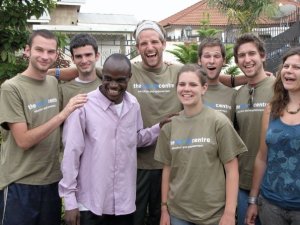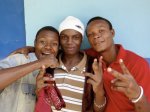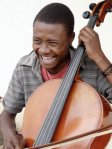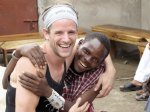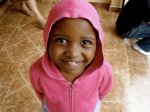Patrick McGuire Returns from Tanzania and Shares His Amazing Experience
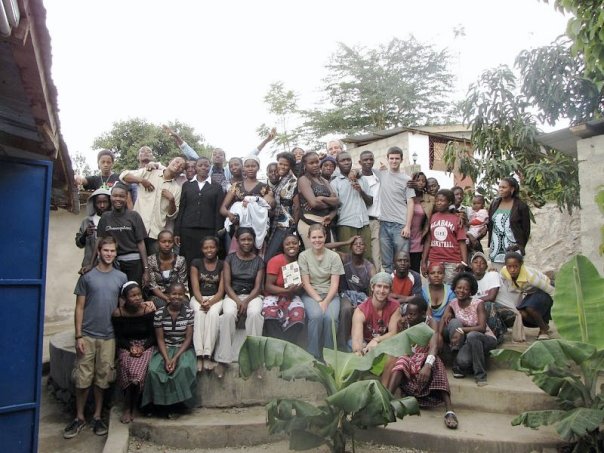
Patrick McGuire is back from Tanzania! The 19-year-old cellist and From the Top alum has completed the two-week arts program for young adults called the “Arusha Arts Initiative” that he designed with five of his peers at Juilliard. (If you want the backstory, we blogged it! Here‘s an interview we did with Patrick when he was just getting started, and here‘s an update from when he was gaining steam).
It sounds like the Arusha Arts Initiative was an incredible experience. Patrick sent us an update recently through Facebook with the details of his trip where he met an amazing group of Tanzanian students. At the end of the two-week program, the Juilliard and Umoja students worked collaboratively to create a performance that ultimately raised enough money to cover all the costs of running the Umoja Youth Empowerment Center for a month!
Read his update and see more photos after the jump. (Hang in there – the update is long, but it’s interesting and very much worth the read). Thanks Patrick for sharing your experience with us!
Working with the students in Tanzania was the most amazing experience I have ever had. Umoja, the school we were teaching at, offers free classes in English, computing, and other key skills such as health and safety to forty students who cannot afford to attend the public schools in Tanzania. The students have traveled from every corner of the country to attend this school because it offers them a chance to escape the extreme poverty that they have been living in since they were born. We didn’t know much about the students when we went in: they were 14 – 29 years old and none of them could afford to go to school. Many of them had gone through difficult situations that we could only imagine. Our challenge was to create a two-week-long program that would challenge them to take risks and go outside of the box. Our solution: performing arts…
We split up into three groups of 12-14 students, named Simba, Kiboko, and Nyati (lion, hippo, and water buffalo, respectively). Each group spent a day with music, a day with dance, and a day with drama. Each one of the artistic disciplines challenged the students differently. In the dance workshop, students worked on partnering, mirroring, and some choreography. In the drama workshop students participated in activities such as jibberish conversations – those without real words, but a conversation based on body language and voice inflection. Students in the music workshop taught us several Swahili songs, experimented with drumming rhythms and dancing along with the music, and tried out our instruments as well. The students were shy, but with encouragement they were completely engaged and participating fully in every moment.
We combined the three groups together at the start of every day, after lunch, and at the end of every day to play games. We played so many games with them that I don’t think I could possibly try to name all of them…. These games were the most valuable activities that we did with the students. They encouraged the students to push themselves to the limit and feel important as an individual within the larger group. As the two weeks progressed we saw enormous development in their attitudes. Everyone opened up and began to feel more and more comfortable with showing off who they really are as individuals. This was an amazing transition to experience.
Let me take a moment to explain the type of poverty that these students have experienced for their entire lives. I have seen many different statistics, but about 20% – 50% of the population is living below the poverty line. Students live in small, singe-room mud houses with bees nests hanging from the ceiling and glassless windows. The lucky ones have electricity….. Many of the girls are house maids. One student wakes up at 6am every day to cook breakfast, lunch, and dinner for 25 people, walks an hour each way to and from school, and cleans and does laundry for the same 25 people at night when she returns. Another student is a house maid and hasn’t been paid since January. She would try to leave, but her closest family live two days of traveling time away – an impossible journey to make safely. Even though she is not being paid at the house she is at now, she is guaranteed food and shelter, so she stays. Many students have lost their parents to HIV/AIDS, the deadly disease that affects 1.6 million people in Tanzania, over 8% of the population. This is why going to Umoja is so important to these students. They want to get jobs and live better lives.
So how is a two-week-long performing arts workshop going to help these students get jobs?
Confidence. So many of the students were completely lacking in confidence because of family deaths, hunger, and general dejection. Through all of the fun and games, the students emerged out of their shells and thrived socially. This was an invaluable experience for them. We created a performance of singing, dancing, comedy, and story-telling that the students cherished and owned as their own. They performed their creations at a fundraiser for Umoja and raised about 820,000 TSH for the school, which will cover all of the school’s expenses for the month. This kind of experience seems to good to be true, but it is really quite the opposite. We were just ourselves, six Juilliard students, and did what we do every day, music, dance, and drama, and impacted this community at a level that we cannot possibly comprehend. Now that is an amazing feeling.
Making a difference is not hard to do! Just be yourself and have fun along the way.
What’s next for Patrick and the Arusha Arts gang?
“We desperately want to go back if we can raise the money again!” Patrick said. As of today, though, they have no concrete plans – yet.
If you’d like to see more photos of the Arusha Arta Initiative, click the pictures below to look at some of Patrick’s public photo albums on Facebook

